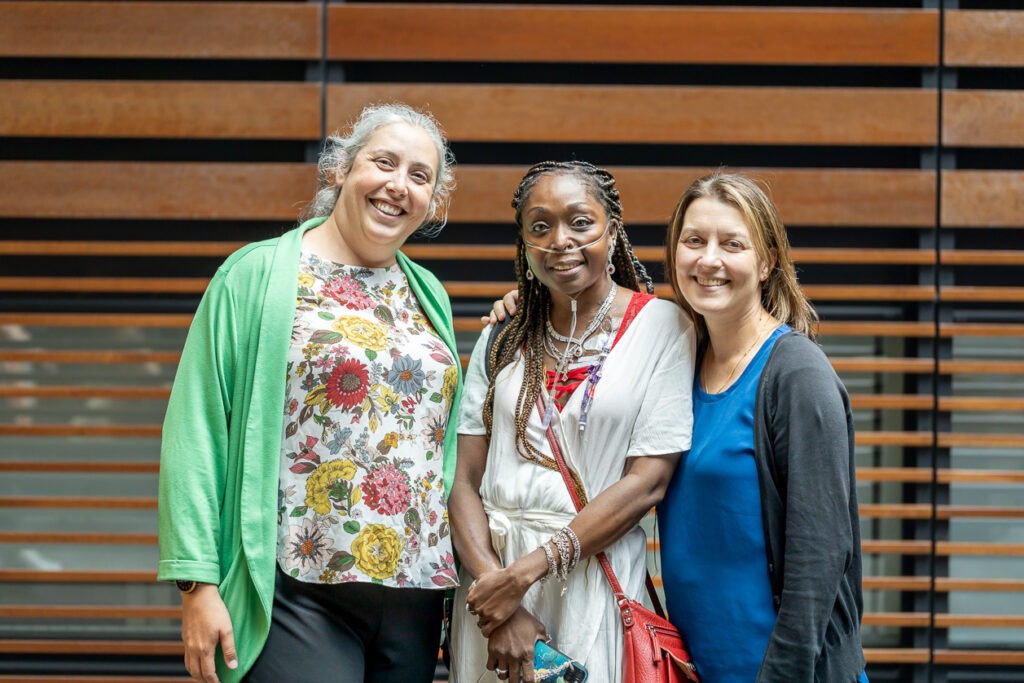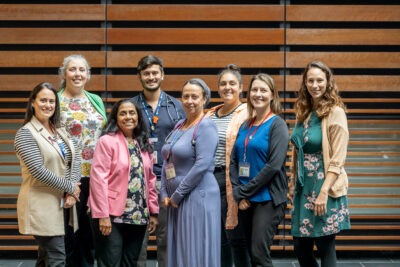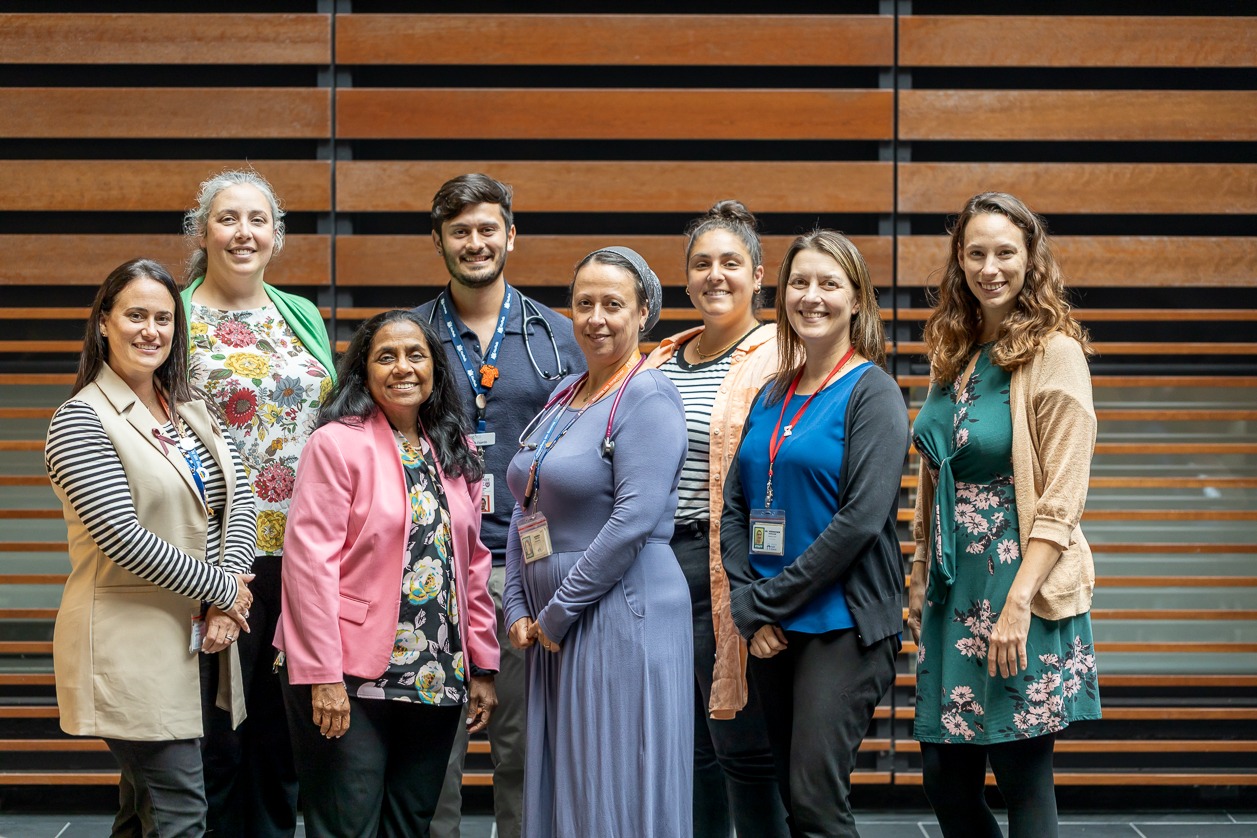
HHS Hemoglobinopathy Clinic “a lifeline” for sickle cell patients
No one ever asked Roxanne Mahony, age 46, what she wanted to be when she grew up. That’s because in Trinidad, having sickle cell disease was considered a death sentence, says Mahony, who was born and raised there.
“I was always told that I would die before I reached 17 years old,” says Mahony, who immigrated to Canada over 20 years ago and lives in Hamilton. She’s sharing her story for Sickle Cell Awareness Month in September.
Mahony receives care at Hamilton Health Sciences (HHS) Adult and Pediatric Hemoglobinopathy Clinic, located at HHS McMaster University Medical Centre (MUMC). Hemoglobinopathies are a group of potentially life-threatening genetic disorders that include sickle cell disease.
“Having sickle cell disease is lifelong, which is why support from the clinic has been such a lifeline in helping me manage.” — Roxanne Mahony, patient.
What is sickle cell disease?
Many of the clinic’s patients live with sickle cell disease, which causes red blood cells to become hard and crescent shaped, like a sickle, making it difficult for them to travel through small blood vessels which then slows or blocks blood flow. It affects people of African, Caribbean, Latin and South American, Indian, Asian, Middle Eastern and Mediterranean descent, and can lead to health issues including strokes, serious infections, chronic pain and lung problems.
“The clinic’s doctors and team understand exactly what the patients’ needs are, as well as their family members’ needs,” says Mahoney, who attends for ongoing monitoring, monthly blood transfusions to improve oxygen supply, and support from the clinic’s social worker.
10-year anniversary for clinic

Dr. Uma Athale, pediatric hematologist
Key players in developing and opening the HHS clinic 10 years ago included Dr. Uma Athale, a pediatric hematologist, and Dr. Madeleine Verhovsek, a hematologist who treats adults. They envisioned a clinic for seamless care from birth through adulthood with a focus on patient education and management of symptoms and complications.
Before joining HHS in 2001, Athale had worked with hemoglobinopathy patients in India, Africa and the United States. Back then, sickle cell disease was still uncommon in Ontario though the numbers were rising.

Hematologist Madeleine Verhovsek
“We were starting seeing more immigration from areas of the world where such diseases are common,” says Athale. “These patients couldn’t be managed by our hemotology/oncology clinics alone. They needed focused care.”
In 2007, Ontario added hemoglobinopathy testing to routine newborn screening, allowing sickle cell disease to be caught in infancy so it could be managed for life.
After several years of planning and advocacy, the hemoglobinopathy clinic opened in 2013 at MUMC as a pilot project, with over 80 patients. Today, the team cares for more than 400 patients, evenly split between children and adults.

Clinic team members include, left to right: Angela Filice, clinical manager; Dr. Sarah Patterson, hematologist; Dr. Uma Athale, hematologist; Dr. A. Felipe Fajardo, medical student on rotations; Hanna Tseitlin, nurse practitioner; Sarah Rashid, social worker; Dr. Madeleine Verhovsek, hemagologist; and Erin Burrell, registered nurse.
The now-permanent clinic has expanded over the years, thanks in part to lobbying from organizations including The Sickle Cell Association of Greater Ontario. As well as Athale and Verhovsek, the clinic team also includes pediatric hematologists Dr. Meghna Dua and adult hematologists Dr. Sarah Patterson and Dr. Kristine Matusiak, as well as nurse practitioners, a nurse and a social worker.
Pediatric care
When newborns are identified through screening, the focus is on infection prevention using antibiotics. Children with sickle cell disease can also receive additional immunizations to prevent pneumonia and meningitis. They attend regular follow-up appointments, and arrangements can also be made for testing of patients at high risk of stroke. Hydroxyurea therapy to enhance fetal hemoglobin is also offered. This type of therapy helps to strengthen red blood cells so that they’re less prone to having a sickle or crescent moon shape and breaking down. This therapy also reduces disease-related complications, including pain episodes.
The only cure for sickle cell disease is a bone marrow transplant, but not everyone is a candidate. For those who are, transplants take place at Toronto’s Hospital for Sick Children, with follow-up care at HHS McMaster Children’s Hospital.
Older teens also receive support transitioning from pediatric to adult care.
Adult care
Mahony visits once a month for support that includes blood transfusions. Sickle cell disease affects her lungs, and she has relied on a home oxygen system for 10 years. Mahony says she always feels better after visiting the clinic for a transfusion. She’s also grateful for the emotional support from a clinic staffed by people with deep knowledge of her disease, who don’t judge.
“I don’t think people understand how much people with sickle cell disease have to deal with,” says Mahony. “Having sickle cell disease is lifelong, which is why support from the clinic has been such a lifeline in helping me manage.”
This story is one of a two-part series: Read Hemoglobinopathy Clinic a role model in health equity



